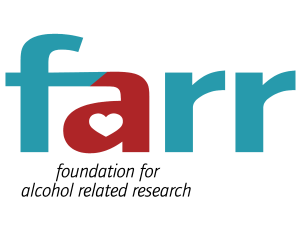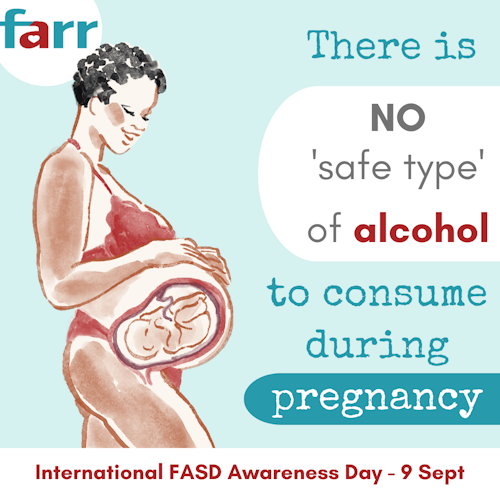Press Release – International Fetal Alcohol Spectrum Disorder (FASD)
FOR IMMEDIATE RELEASE
September 2016
International FASD day: 9 September – ‘No amount of alcohol is safe during pregnancy’
There’s a condition that doesn’t discriminate against culture, faith, politics, status or designation, nor does it hint towards the existence of a cure. It seems there’s only one thing it firmly stands by – the fact that it is 100% preventable.
Fetal alcohol spectrum disorder (FASD) is a lifelong, incurable condition caused by prenatal alcohol exposure – not necessarily abuse. To raise awareness about FASD and fetal alcohol syndrome (FAS), the most severe of these disorders, 9 September was declared International FASD day in 1999 and has since been commemorated around the globe.
In South Africa, the Foundation for Alcohol Related Research (FARR) has been at the forefront of research, awareness and prevention in this regard and has gained world-wide recognition for its work. However, a lot still needs to be done, says FARR chief executive Leana Olivier.
“There are still many myths around FASD. Some people still believe, for instance, that a woman must be an alcoholic to give birth to a child with FASD. The truth is, however, that no amount of alcohol is safe during pregnancy,” she says.
“There is no known safe amount of alcohol pregnant women can drink without raising the risk of damaging their unborn babies.” Olivier reiterates.
She says a large proportion of children with ADHD-like symptoms – a common behavioral disorder in all communities – could be attributed to alcohol consumption during pregnancy.
FASD is a broad spectrum of abnormal signs and symptoms in children due to mothers drinking when they were pregnant with these children. FAS is a mental disability – the most severe of the fetal alcohol spectrum disorders. In this case the damage to the unborn child is permanent and cannot be reversed, Olivier explains.
“A child with FAS can suffer from various defects, apart from intellectual deficits. Apart from damage to the eyes, ears and heart, this may also include brain damage, which results in lifelong problems such as learning disabilities, interpersonal relationship problems, developmental disabilities such as fine motor development, coordination, arithmetic and cause and effect reasoning. In addition, most of these children have attention and hyperactivity problems,” she says.
Looking at statistics makes it abundantly clear why International FASD day is essential in raising awareness on the serious issue of FASD and FAS, especially in South Africa – FARR has completed eleven studies in four provinces recording the highest reported FAS rates in the world. In some areas the FAS prevalence rate is as high as 25%. The Department of Health estimates the average FAS prevalence in South Africa at 6%. “Compared to the next highest rate in the world, namely 1% in the USA, this rate is alarmingly high. The reality is that we have only done research in 4 provinces to date and therefore do not know the extent of the problem in the other provinces. If all goes well, we will start doing work in the other provinces soon,” says FARR founder Prof. Denis Viljoen.
Currently FARR runs research, awareness and prevention projects in the Western; Northern and Eastern Cape Provinces. As part of these projects community
members, health professionals, social workers and educators are trained to raise awareness about and assist in the prevention of FASD in their communities.
Some FARR events on International FASD day include the annual 9km FASD Awareness Walk in De Aar; a 0,9km walk for pregnant women, their families, community members and service providers in Upington; a FASD Awareness Event at the Department of Health Clinic in Wolseley; a variety of Awareness events in the West Coast, Renosterberg area, Bethelsdorp in the Nelson Mandela Bay area and in the Cape Metropolitan area.
The aim of all these events is to raise awareness regarding the dangers of alcohol use during pregnancy and the increase of FASD in South Africa. “Our theme for this year is ‘No amount of alcohol is safe during pregnancy’. This epidemic is 100% preventable. Our plea to pregnant women is therefore not to use alcohol during pregnancy. Rather be safe than sorry,” says Viljoen.
CAPTION TO PICTURE
The white FASD knot symbolises the umbilical cord. The knot is worn in support of the FASD prevention message of “No amount of alcohol is safe during pregnancy”.
NOTES TO THE EDITOR
International FASD day: background
In the late nineties, a group of biological and adoptive/foster parents in Canada and New Zealand got together to decide how best to create awareness and share information regarding the management of children with FASD across the globe. They were concerned about the lack of information regarding FASD. An online parental support group was formed and this eventually led to the establishment of International FASD day. The first International FASD day was held on 9 September 1999 (09/09/1999) and was also commemorated in South Africa.
Why 9 September?
The symbolism of 9 is very important, as a woman is normally pregnant for 9 months.
What happens on 9 September?
Members of the public who are interested in raising awareness regarding FASD are requested to share the prevention message with small groups of friends/colleagues or other community members in doing the following:
- Meet on 9 September at 09:00 and share a short FASD prevention message (See examples of the FASD message at the end of this document);
- Have one minute of silence at 09:08 to think about individuals affected by FASD and their primary caregivers/educators;
- Break the silence at 09:09 by ringing a bell (or bells, e.g. church, school or hand bells) thereby calling people to take action and create awareness about FASD, especially regarding the need for pregnant women not to drink any alcohol during the 9 months of pregnancy.
What is the FASD knot?Participants are encouraged to wear the FASD knot on the day.
The white cord is tied in a knot known as the reef knot or the reef knot. The knot is worn on your chest in support of the FASD prevention message.
The knot symbolizes the following:
- Cord with worn ends: the umbilical cord whereby the baby receives food and unfortunately also alcohol from the pregnant woman; and the central nervous system (brain) which can be permanently damaged by the alcohol;
- Knot: This type of knot is so strong that it will not break if traction is put on it, it will pull tighter. This symbolizes the strong support that we are supposed to give pregnant women and people with FASD.
The circle inside the knot: Symbolizes the uterus/womb of the pregnant woman that should provide a safe environment for the unborn baby to develop free from alcohol.
ENQUIRIES
Leana Olivier
FARR (Foundation for Alcohol Related Research)
Tel: 021 686 2646
Fax: 021 685 7034
e-mail: info@farrsa.org.za
Website: www.farrsa.org.za
Address: Unit 5 Amber Place, 42 Bloemhof Street, Bellville 7535





